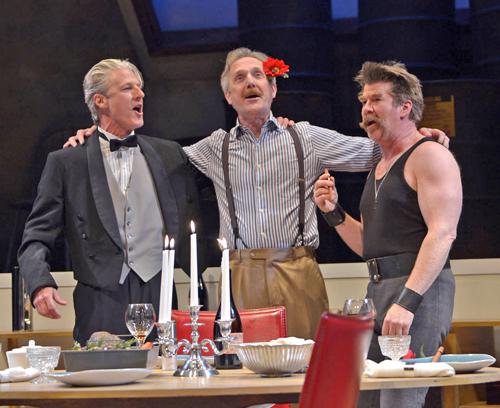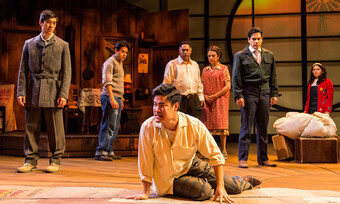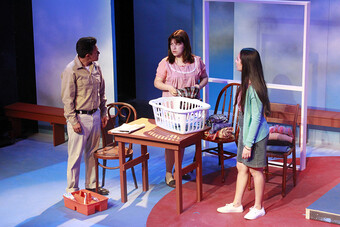The Slow, Cold Burn of the Aurora Theatre’s The Arsonists
In the Aurora Theatre’s promo video about The Arsonists, by Max Frisch, director Mark Jackson explains the choice to set the play not in Frisch’s postwar Germany but in a world seemingly outside of time and place: “What I like so much about Alistair Beaton’s translation is he doesn’t tie it to any particular time, place, or ideology. It’s very much about any society that is choosing to ignore a problem that is right there in front of them.”
The design of Jackson’s production is correspondingly ambiguous. Christine Crook’s costumes feature a man’s dressing gown and a maid’s uniform that would fit perfectly in a Katharine Hepburn movie as well as the wardrobe of a contemporary lady who lunches, complete with leopard print leggings. The set, by Nina Ball, is also a pastiche: a dining set features contemporary skeletal chairs, a table with the extravagant curves of mod, and an ornate silver candelabra on top.
On the surface, this play is about a town plagued by arsonists who succeed not in secret but by manipulating their victims’ noblesse oblige. Frisch meant it as a comment on the Nazis, but in Jackson’s production, the political allegory resonates hauntingly with our own time of rigid class divisions and soaring inequality.
Frisch meant it as a comment on the Nazis, but in Jackson’s production, the political allegory resonates hauntingly with our own time of rigid class divisions and soaring inequality.
Jackson, a director, playwright and actor, has been making theater in the Bay Area for eighteen years. His subject matter is old school—focusing on the individual in conflict with society and its mores. His Salomania, also at the Aurora, pitted a notorious Salome performer against her conservative British society; his God’s Plot, at Berkeley’s Shotgun Players, pitted a young girl and the theater she wanted to be a part of against conservative colonial America. He’s also done striking productions of Kafka’s Metamorphosis and Buchner’s Woyzeck. But if he shares concerns with dramatists from a century ago, his stagings are always fresh and lively. His highly stylized, Viewpoints-inflected movement sequences are crisp and elegant. His scene changes alone have the sharp yet fluid choreography of a ballet.
The Arsonists opens with just such a well-orchestrated moment. Biedermann (Dan Hiatt) is in his sumptuous home lighting a cigar. But the instant the flame appears, the lights shift, brass and a metallic slamming sound signal alarm bells, and three firefighters (Kevin Clarke, Tristan Cunningham, and Michael Uy Kelly) jump onstage to douse the tiny spark. “Our equipment all gleaming, we circle your home, watchful, yet never thinking the worst,” they tell us, speaking in unison (as they do almost throughout the play), though they clearly are thinking the worst, and with good reason, as arsonists are destroying their town. In their watchfulness, they aren’t just looking for fires and criminals; they’re also functioning as the show’s Greek chorus, as they themselves declare later in the text:
CHORUS.
As choruses do, we draw near,
Politely posing our questions,
Powerless, watchful,
Showing concern,
Issuing warnings,
Bathed in cold sweat,
Till it’s too late to put out the flames
Often, they watch entire scenes from different corners of the Aurora’s tongue-shaped stage, their stern countenances and always searching eyes lending weight and urgency to the already weighty proceedings. (In the play’s one misstep, they’re also like a Greek chorus in that they too didactically expound upon the play’s central message.)
Most telling about the play’s first moment is the way Biedermann reacts to the firefighters and the alarm. He expresses neither surprise nor shame for breaking the law. Rather, he shoos them away as if they’re pesky chipmunks, good-naturedly flitting his fingers as if to say, “Isn’t it a silly world we live in?” His reaction is one not of a man who’s used to a police state but one who, no matter how bad things get, is incapable of having his routine altered or his consciousness penetrated.
That blindness is a product of class. It shouldn’t be hard to recognize the arsonists, as Biedermann already knows their technique: As Biedermann explains, reading the newspaper, “It’s always the same old story, it’s incredible. A complete stranger comes to the door, asks for a bed for the night, and the next day the house is in flames.” When Schmitz enters, he appears to be doing just that:
SCHMITZ.
— not that I’m asking for a bed.BIEDERMANN.
No?SCHMITZ.
I’m used to sleeping on the floor, Mr. Biedermann. My father was a miner, you see. I’m used to it…
Schmitz exudes trouble. Sturdy in build, he’s a former wrestler, and, preposterously, he still walks around in wrestling-ready clothes, with a necklace and greasy hair to complete the ensemble. He helps himself to food and wine, wolfing it down as if at a feeding trough. As played by Wisely, he drips with unctuousness, his wide-eyed innocence having all the authenticity of a clown’s mask.
Yet, despite all this, it’s deeply understandable when Biedermann not only doesn’t kick him out right away but consents to his staying. Schmitz, of course, has great powers of persuasion in his arsenal. He knows just which buttons to push:
SCHMITZ.
Yesterday the whole café could tell that you still believe in the goodness of people, not to mention the goodness within yourself. Am I right? You’re the first person in this town who doesn’t treat me as if I’m no better than an arsonist.
And later, when he invites in his partner Eisenring (Tim Kniffin), the pair model good cop-bad cop. For Biedermann’s part, it’s awkward to ask someone to leave, to put your foot down, to protect your home and family when you’ve never been asked to before. And Biedermann’s conflict avoidance isn’t just a personality trait; a 20th-century Candide, he thinks the best of everyone as a practical philosophy. If you simply treat everyone as if they’re good people, he believes, or wills himself to believe, it’ll be a self-fulfilling prophecy, good will willing the arson away.
Yet it’s also clear that Biedermann and his wife Babette (Gwen Loeb) are generous toward the arsonists out of a perverted sense of class guilt. “Please don’t look at me like that,” Babette says to Schmitz (Michael Ray Wisely), the first arsonist. “Your father was a miner, I understand. You probably had a terribly hard childhood.” By contrast, Anna, the maid (Dina Percia), has the clear vision of the proletariat. She immediately recognizes Schmitz for what he is (and heroically tries to glare him away).

The rest of the play carries Biedermann’s choice to house the arsonists to its logical extreme. If you’re willing to put yourself in a little bit of danger for the sake of keeping up appearances, what else are you willing to do? Biedermann can never draw that line. His adherence to his naively optimistic principles is in a perverse way almost admirable even as it’s sublimely stupid. It takes courage to believe in an idealistic world, just as it’s only cowardice to refuse to imagine that reality could be different—especially when, as the play progresses, the arsonists are more and more obvious about being, well, arsonists. They roll oil drums into Biedermann’s attic; they even insist that they are, in fact, arsonists. This is all accompanied by the slow burn of Matt Stines’s horror movie-ready sound design, which aurally embodies the feeling of a gut gnawing on itself. In Hiatt’s fine performance, Biedermann’s feverish beliefs gradually alienate him from his family and the very social world he holds so dear. By the end of the play, he speaks a different language and follows different rules from those of the other characters. He is no longer of this world long before he physically departs it. His beliefs and his resulting irrelevancy, not the fire, kill him—which is reflected in Biedermann’s last act of agency: He signs off on his own execution by offering Schmitz and Eisenring a match.
By keeping the production timeless, Jackson makes it too easy to see Biedermann in yourself even as you also laugh at his stupidity. This play is a chilling critique of norms blindly followed, of pieties enacted out of class guilt; it’s also a rallying cry for a little championed but vital human quality: gut intuition.







Comments
The article is just the start of the conversation—we want to know what you think about this subject, too! HowlRound is a space for knowledge-sharing, and we welcome spirited, thoughtful, and on-topic dialogue. Find our full comments policy here